
In 2012, I won a pro se civil lawsuit against Jiffy Lube by settling for $1,800 for the loss of my 1998 Toyota Camry during (in part) a radiator fluid flush. As I started writing this article, I opened a folder in my files with the related documents, and these add up to hundreds of pages of incriminating materials. The fact that I managed to win this lawsuit is an argument for filing lawsuits on your own behalf, but the volume of work I had to complete as part of this fight means that only the most highly educated and workaholic Americans can manage this task. I had to do the work myself because I have never met a reliable lawyer I could trust to put in this volume of work without expecting over $100,000, and certainly not merely my entire settlement amount.
I asked my students at UTRGV regarding this article and how truthful I should be in it. One of them asked, “Did you win?” “Yes.” “Then why are you going to write about it… I mean it’s not like you’re gonna say that Jiffy Lube is this corrupt organization…” “Yes, because I really loved my car, and it was worth more than the settlement,” I replied. Why did he immediately assume that I was going to write that Jiffy Lube is corrupt just because they killed my car during a radiator flush? What experiences has he had with cheap, corporate car mechanics that this is his first impulse?
I have been driving for 20 years, since 1997. I’ve driven in Brooklyn, Bronx, Los Angeles, all across America, through pretty much the worst ghettos and even into Mexico… and Canada. In all my years driving, the first time my car was openly vandalized happened when I started teaching college full-time in 2010 in the quiet, little town of Edinboro, Pennsylvania. I was home in November (a couple of months into the semester, and starting to levy some pretty harsh but fair grades), when I received this note: “Please call me—B*** my phone # is XXX-XXX-XXXX I think the Toyota (Black) is yours & need to talk to you about your back bumper!!! Be home after work around 7:30 B***” I called her (a student at EUP), and she came by my apartment. She proposed paying for the damages out-of-pocket without contacting her insurance company, but then we just went through insurance, which covered all of the damages without a deductible. That was the last time somebody vandalized my car and left a note to inform me of their involvement.
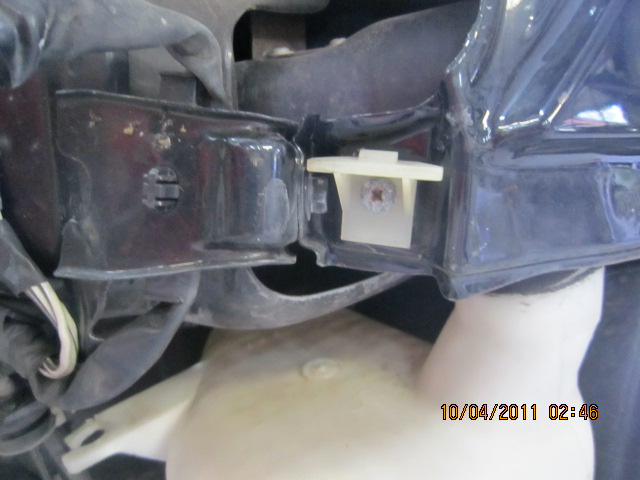
Next year, I was teaching at the Middle Georgia College. It was days into the fall semester, on 8/28/2011. I drove to a Target to buy new outfits. Afterwards, I got in my car, checked there was no movement behind me and started crawling out. I noticed a van suddenly made a jump out of a parking spot on the other side of the row, and came to a full stop. Their movement was so sudden and aggressive that I felt concerned enough to stop. They obviously stopped as well because they saw me. After I stood still for a while, they made another lunge backwards and again stopped. I started beeping to warn them that they were getting too close. My car was at an angle that was too sharp for me to move in the opposite direction or to easily pull back into the parking space because they were now in the middle of the lane, blocking my way. Hearing me and seeing that I couldn’t escape, they then hit the gas and hit me. I called the police, but they only filed an “accident report” instead of filing criminal charges for assault with a deadly weapon (the van). I then had extreme difficulty finding an auto mechanic willing to work on fixing the car before Chandler Collision in Warner Robins finally agreed to do it, charging $679.49 for the work, of which I had to pay a $250 deductible. Nationwide Enterprise insurance had procrastinated the fix for so long, that it was 10/3 when Chandler finally started working on the car. I had been driving it to work all this time, and it was perfectly drivable, with only surface damages on the front bumper. I picked up the car on 10/5, and took it across the road to Jiffy Lube to have them do a full checkup on the car because it had been emitting some strange smells and making strange noises in the interim since the accident, which the insurance company did not recognize as accident-related. Jiffy Lube diagnosed the car as needing oil, an oil filter, a pcv valve, tire rotation, radiator flush & fill service, and anti-freeze coolant, at a total of $147.67. When all this was done, I started the drive back from Warner Robins to Cochran. Immediately after I took the turn between route 96 and 129, my car started smoking and rattling. I stopped, pulled over and called Jiffy Lube for an explanation. One of them drove out to the spot and inspected my car, saying that the radiator had failed. So, I had my car towed back to Jiffy Lube ($65) for them to put in a new radiator, which they got from Advance Auto Parts for $80. I saw them yanking out my old, rusted radiator and shoving in this new radiator with hardly another check or preparation. I later learned that a radiator change is a very delicate procedure, which if done incorrectly is likely to cause a bleed into the engine. And this is exactly what happened. Just before closing, Jiffy Lube surrendered my car back to me, saying that it was now fully fixed. I heard the same slight clanking noise I heard before, but hoped for the best in the first 14 minutes, or so, of the trip, before the car once again started smoking and collapsed at the identical spot at the 96 and 129 intersection. The duplication of the point of catastrophic failure suggested that the car must’ve been deliberately broken before my first departure. The less conspiracy-theory explanation was that the radiator flush cannot be performed on an extremely old radiator that might have 178,490 miles on it in a used car (for which the operator does not know its earlier maintenance history); a new radiator should’ve been put in to begin with, and this should’ve been done by a professional company and not by somebody that specializes in oil changes. The second failure happened late in the evening, after Jiffy Lube was closed. I called AAA (from which I unsubscribed at that point and never used again) a dozen times, and spoke with the towing service as many times (all the while waiting alone at the side of the semi-highway) before they finally came out and towed me ($47.50) now to a junk yard in Cochran (I no longer had hope that Jiffy Lube could fix this problem). By the time I got home, it was around 3am on Thursday, when I had to teach an 8am class, in a few hours. I had to take a taxi to work ($200 in extra expenses, together with later needing to buy a whole brand new car) in the following weeks because I was in limbo and thought somebody might still pay to put in a new engine into my old car.
PS: A similar incident happened to me in the previous spring, when I was kicked off a Delta flight (after presenting at the SAMLA conference) without cause (just like the Asian American doctor that had patients to see next day in recent news reports) and had to drive through the night in a rented car from Atlanta to Pennsylvania, a 14-hour trip, to teach classes that morning; at least Delta paid for the rental ($350 or so) without a lawsuit.
I immediately filed a claim with Nationwide for them to cover the total loss of the cover as part of the original claim for the parking lot collision, as it seemed something could have been internally damaged during the collision that eventually led to the failure. Nationwide declined the claim on the basis that the failure was mechanical and due to the age of the car. Both Jiffy Lube and Chandler denied responsibility for causing the damages and also blamed my elderly vehicle.
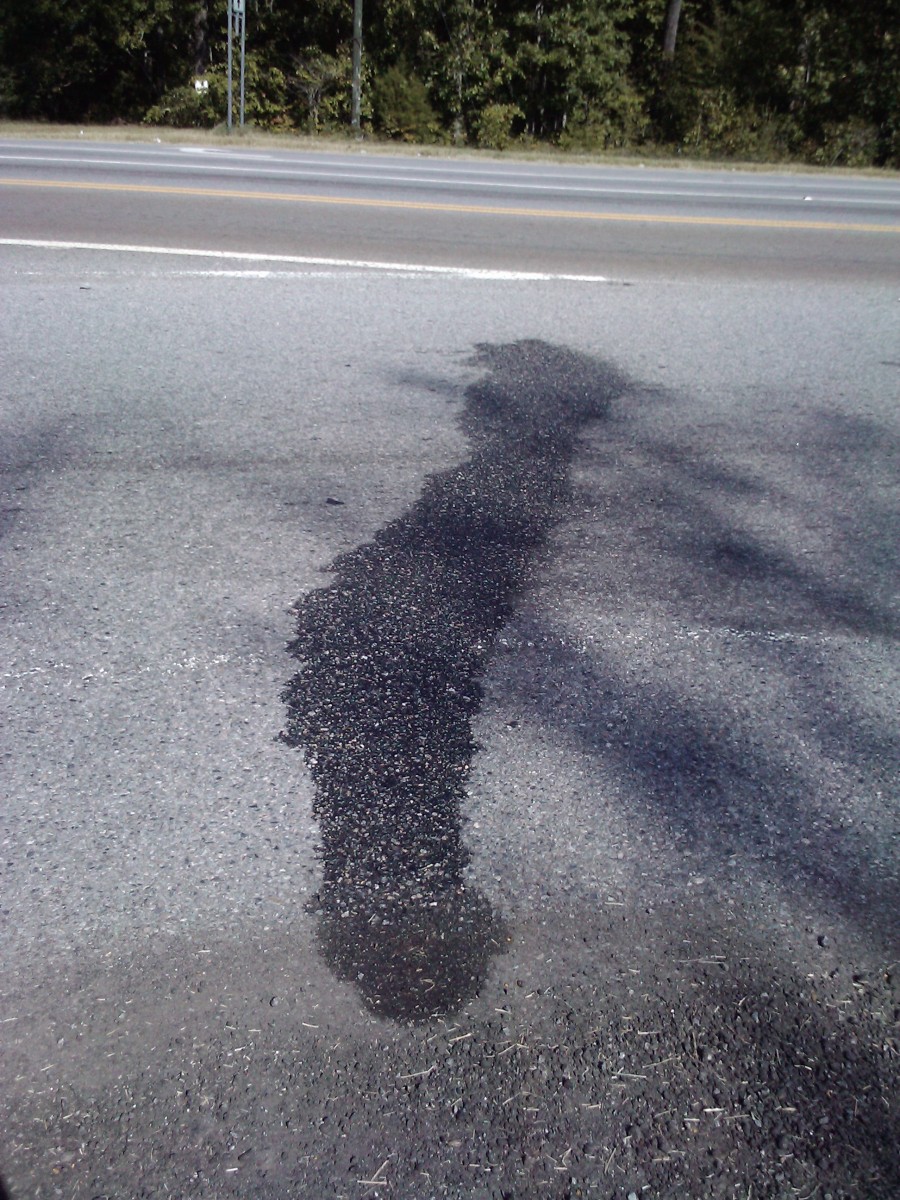
I kept detailed records and took photographs of everything related to this incident. A photo from the scene of the first breakdown shows a long strip of radiator coolant spilled in a perpendicular pattern across the road where I pulled the car over. There is also a photo of the mechanic that put in a new radiator showing a hand-length gap in my old radiator. I don’t have a similar photo of the new radiator they put in, but if the fault was an accidental cracking of the radiator, why would a brand-new radiator have cracked in an identical pattern, leading to the same smoke, rattling and engine failure. Only if the engine had already been damaged could it have cracked both radiators in the same way. Thus, either Jiffy Lube or Chandler must have damaged the engine during their repairs because the car was fine before they started, and kept exploding the radiators after they completed the work.
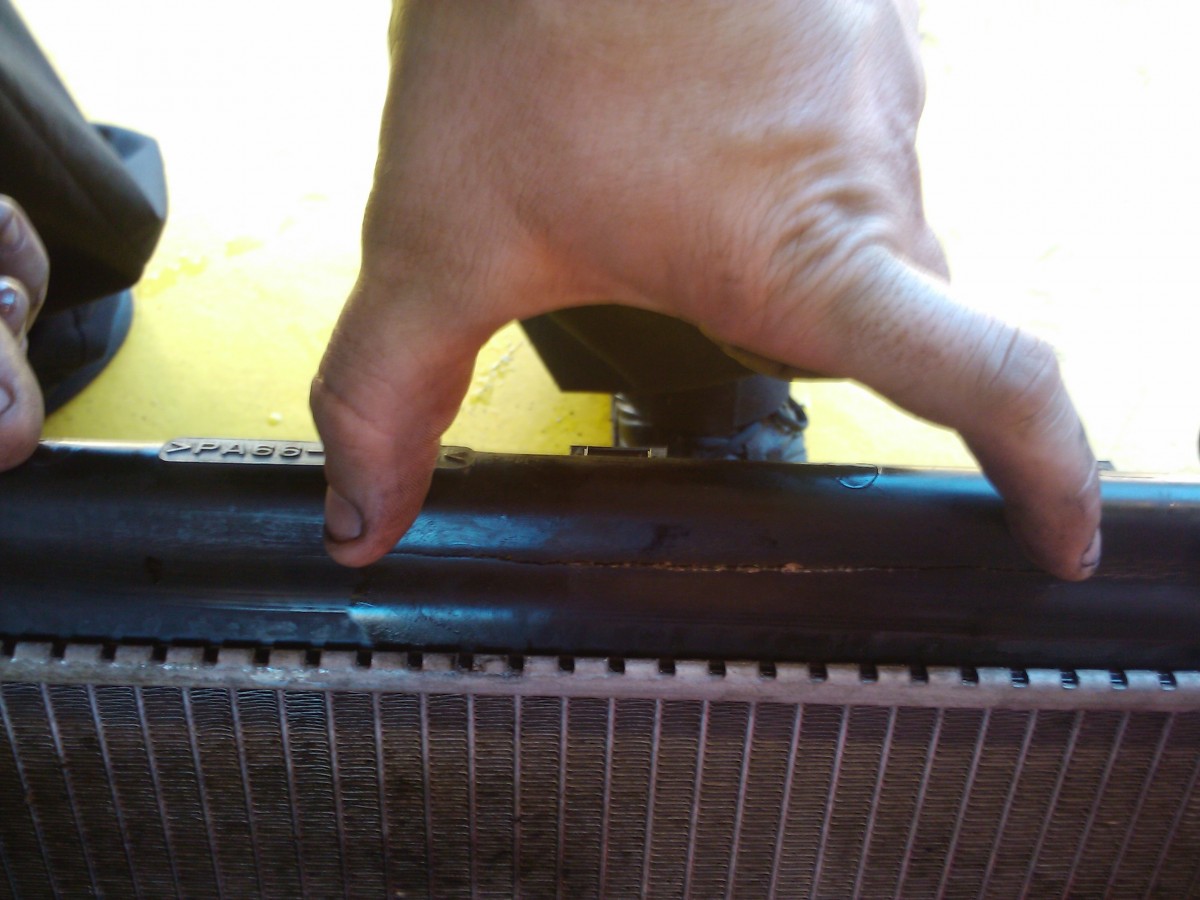
After the insurance claim and BBB complaints failed to convince all parties that they were in the wrong, I filed the first civil lawsuit against Jiffy Lube, as the damage occurred after they worked on it twice. Initially, they said that they had a video of the work they did on the car. I saw the mechanics slacking and fooling around during this “work,” so I definitely was happy to see that video. When I welcomed it, they said that it so happened that the camera was broken only for that episode with my incident, emailing a jpeg of their camera’s files log to prove this claim. This file had a very strange problem as it was truncated, mailing only the top 3 lines visible. The full image is only visible in the preview, so I created a viewable version of it for this article with the Snipping Tool (a new trick I did not know back then). It says that the camera was recording on 9/24, but stopped and did not record through 10/10, when it resumed regular recording. If I asked them for the video immediately on 10/6, why would they have needed until 10/10 to turn this camera back on? This is just one example of the nonsensical nature of the evidence Jiffy Lube offered in their defense.
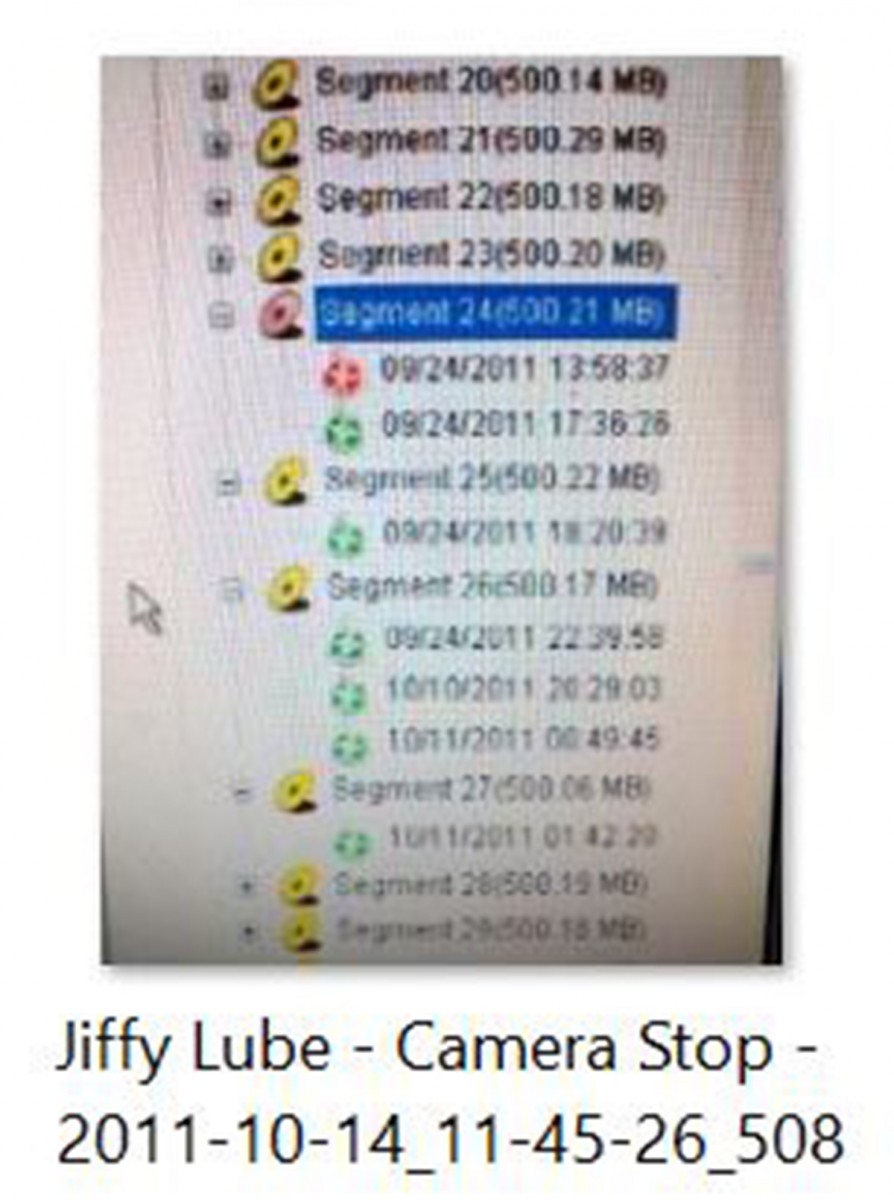
I officially filed a case with the Magistrate Court of Houston County, Georgia on October 30. The claim is a brief form that asks for information on the plaintiff, the defendant, and the type of claim (“Fair Business Practices Act Violation”), together with the reason for filing in that jurisdiction: “business is run in the county of filing.” I initially asked for $3,152 in damages because my 1998 Toyota was worth $2,045 according to the Blue Book, as it was completely totaled and I gave it away to the junkyard for scrap metal after paying them $450 to examine the cause of the damages (which they explained was “engine failure,” as a pistol inside the engine blew up). Alternatively, I found a cheap fitting engine and it would’ve cost $3,151 to replace it and pay for the other damages, but I scrapped this idea because something other than the engine might have been the true cause of the problem. The magistrate court filing costs came up to $170. The cause for filing I put on the form was that when the Jiffy manager said, “We weren’t looking for no cracks,” he admitted negligence or failing to find a potentially catastrophic problem with my old radiator.
I wrote 7,614-word letter to the President of Jiffy Lube, Rick Altizer, and also submitted this information to the magistrate court. Its entirety won’t fit here, but here are the key points. Georgia state law’s Fair Business Practices Act protects my right as a consumer against “unfair or deceptive practices.” I went on to cite case law. In TOOKES v. MURRAY (2009 Ga. App. LEXIS 532,*;297 Ga. App. 765;678 S.E.2d 209;2009 Fulton County D. Rep. 1705), the doctor’s treatment of the patient “demonstrated such an entire want of care that would raise the presumption of a conscious indifference to consequences and thereby justify an award of punitive damages, even under a ‘clear and convincing’ standard of proof. n13.” Jiffy Lube’s mechanics showed a similar “entire want of care” and “conscious indifference,” which led to the loss of my vehicle. I then cited numerous similar previous lawsuits against Jiffy Lube. Since before 2003, there have been numerous reports of consumers against Jiffy Lube locations in North Carolina, California and several other regions. For example, in 2007, in North Carolina, a UCG student, Kateland O’Donald, left her car at Jiffy Lube and they put oil in her car with the car on, causing engine failure. Then, I included several pages of my close research into the clues the car showed for the failure, which pointed to sabotage at worst or negligence at best by Jiffy Lube. I also included the various complaints I made on the matter together with the Governor’s Consumer complaint form (to which I never received a response).
Before the trial, I did in depth research into court procedure, and put together several pages of detailed questions for the managers of Jiffy Lube and Chandler (who I called as a witness). Here is one question from this list: “Is it your common practice to check the radiator for possible 6 inch cracks while you are inspecting the fuel and radiator system or while you are performing a radiator flush?” The trial was scheduled for 2:30pm on March 21, 2012, and I continued my questioning through 4:30pm, when the court had to close and the Judge asked me to wrap up.
After this grueling session, the managers from Jiffy Lube approached my newly bought car in the lot and suggested they might be interested in a settlement. The Judge eventually ruled against me, with a lengthy explanation that concluded that I did not have sufficient proof for my claim of negligence. I had expected to lose at this initial filing, so I immediately appealed this case to the county-wide civil court. I prepared a lengthy list of witnesses and additional research for the pre-trial, and asked for a week to fully make my case. The Judge gave me a full day. The Judge also insisted that we had to attempt to mediate this matter before proceeding to the trial. The mediation would’ve been an additional cost, and would’ve been pointless because the case was clear cut. So, I insisted that if Jiffy Lube wanted to settle we had to do it without going through the mediation process. I asked for $2,000 simply because I wanted to cover the costs I took on to fight this case. They thought about it, and proposed dropping the total down to $1,800. I agreed, and after they paid me, I composed and filed the necessary paperwork to drop the case.
If you’re keeping score, the total losses I endured and should’ve been suing for add up to around $25,000 (new car) + $3,152 (old car) + $450 (damages inspection) + $170 (court) + $147.67 (Jiffy Lube) + $112.50 (towing) + $200 (taxi) + $250 (insurance deductible) = $29,482.17, or my entire annual teaching salary, after taxes.
Instead of this fair settlement amount, I had to settle for $1,800 because I could not continue the case into the following school year, for which I had to move to China to work for Shantou University. Before the relocation to China on a 3-year contract, I had to sell this newly bought car for less than ½ its cost. Sadly, I was forced to resign from Shantou at the end of the first semester due to a bleeding illness (h pylori food poisoning), and had to buy yet another brand-new car (another $25,000) upon return to the states to teach at a college in Arizona. But, I digress.
Shortly before the final settlement with Jiffy, at the end of that school year, just when grades were due, on May 17, 2012, somebody hit my car with a metal instrument or with another car while I was in the Hong Kong Restaurant in Cochran. I heard the car’s alarm go off, but did not connect the two. My brand new 2011 Toyota Corolla had “three deep scratch” (according to the police report) and dent on the bumper. Obviously, no culprits were caught and no charges were pressed despite this new vandalism happening in broad daylight and on the main street in the town, where there were numerous cars and pedestrians that must’ve heard the alarm go off.

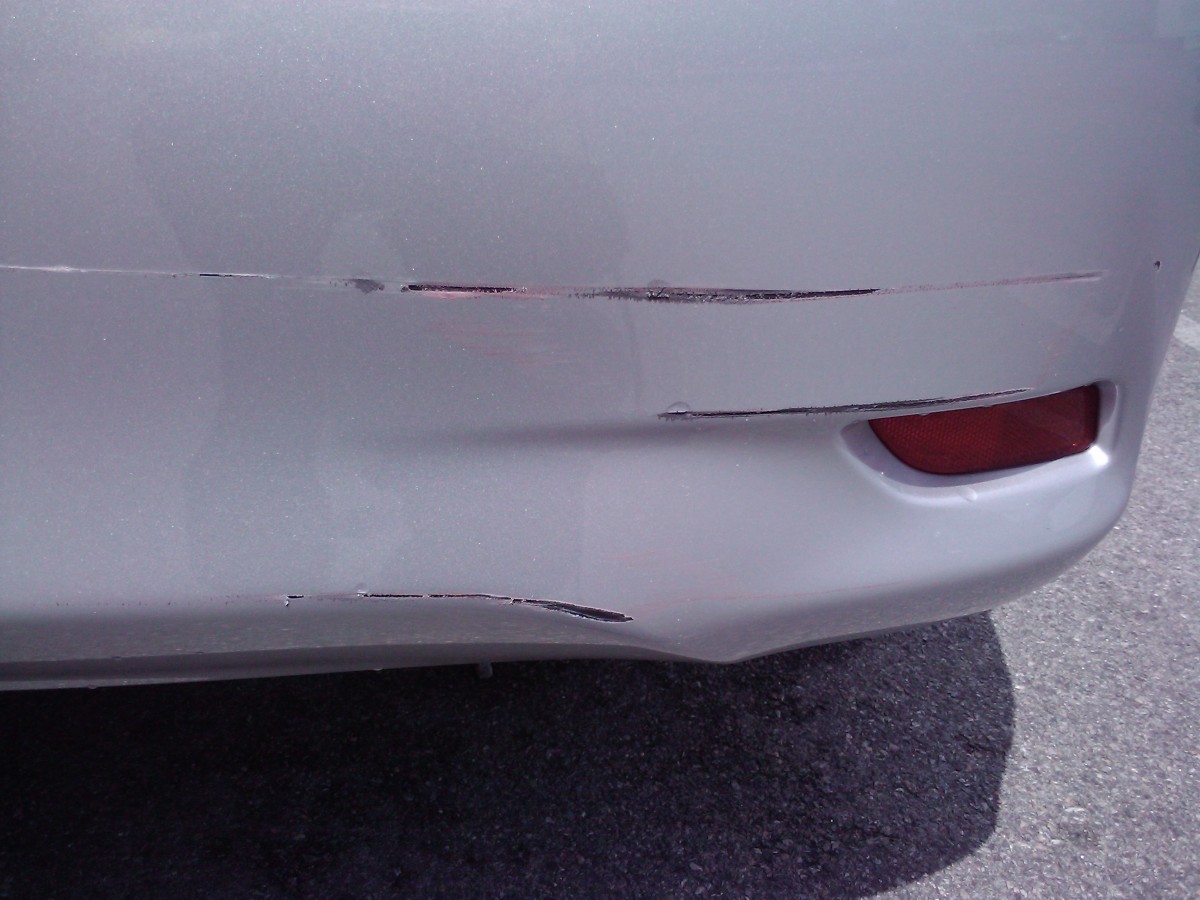
Could a lawyer have helped me to win a bigger and fairer settlement from Jiffy Lube, or would a lawyer have guaranteed a complete failure? Regardless, if you were in my position, you probably wouldn’t have trusted a lawyer either. Considering the costs involved in proving and filing a case, only the upper class can afford filing civil lawsuits by any means other than pro se in the US. So, the rest of us should practice pro se litigation when there’s cause for it, so that we’ll be prepared to engage in it if an emergency makes it unavoidable.









